中考一轮教材复习课件 七年级上(Units 7-12)(22张)
文档属性
| 名称 | 中考一轮教材复习课件 七年级上(Units 7-12)(22张) | 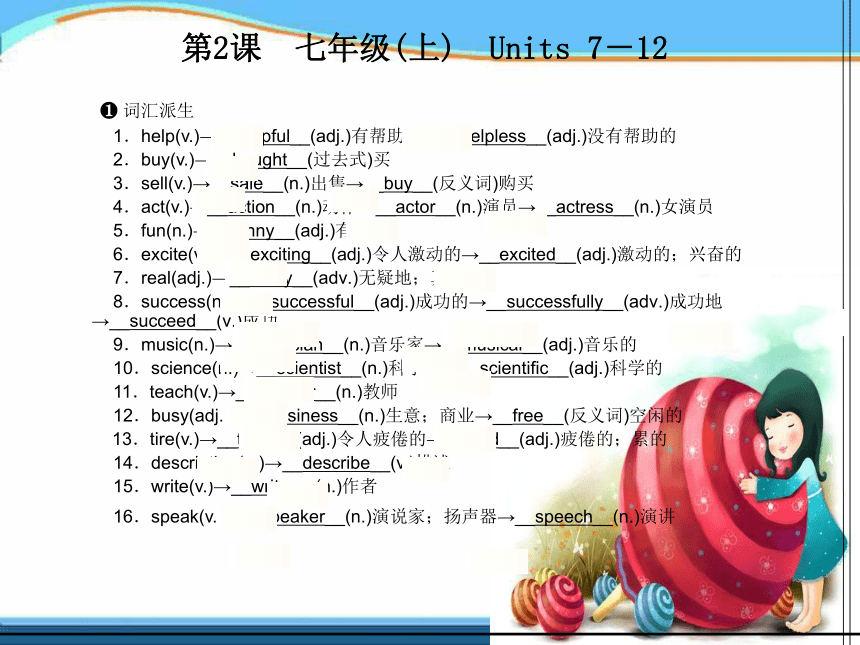 | |
| 格式 | zip | ||
| 文件大小 | 242.5KB | ||
| 资源类型 | 教案 | ||
| 版本资源 | |||
| 科目 | 英语 | ||
| 更新时间 | 2014-03-19 11:31:04 | ||
图片预览

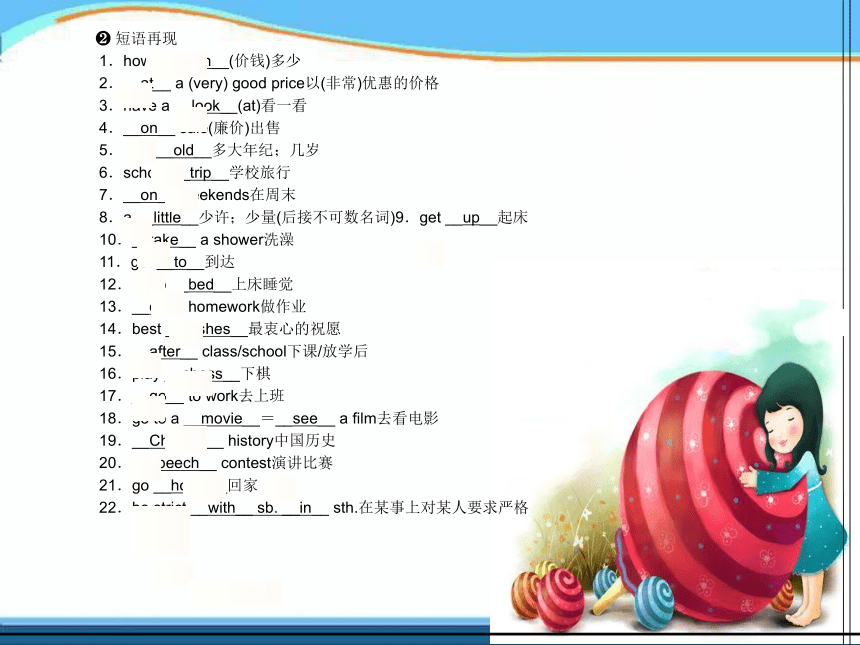
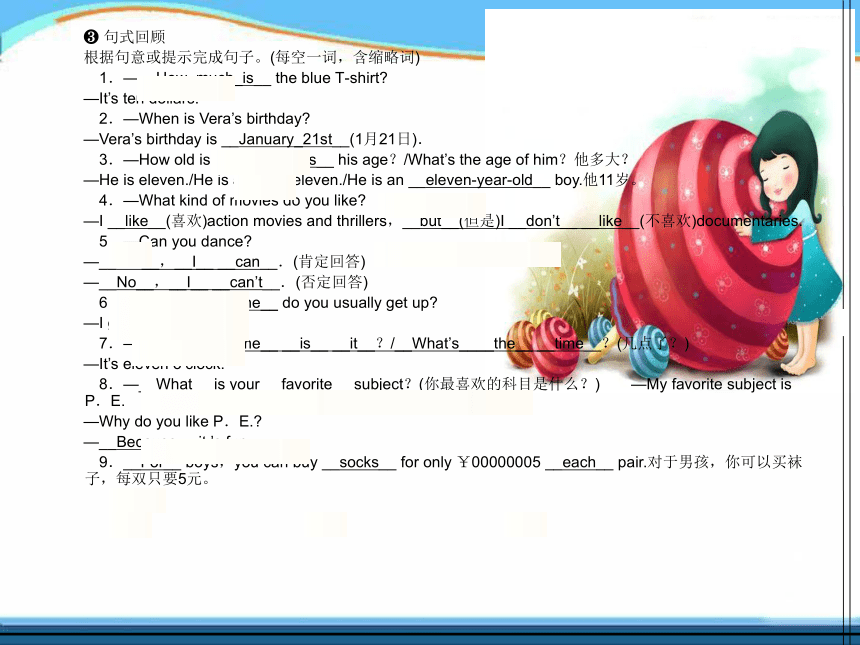
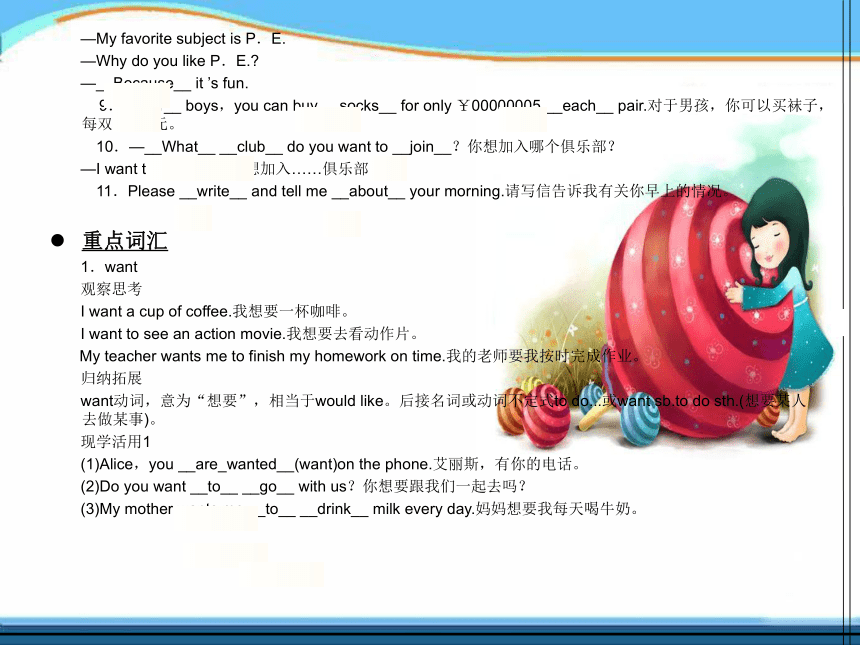
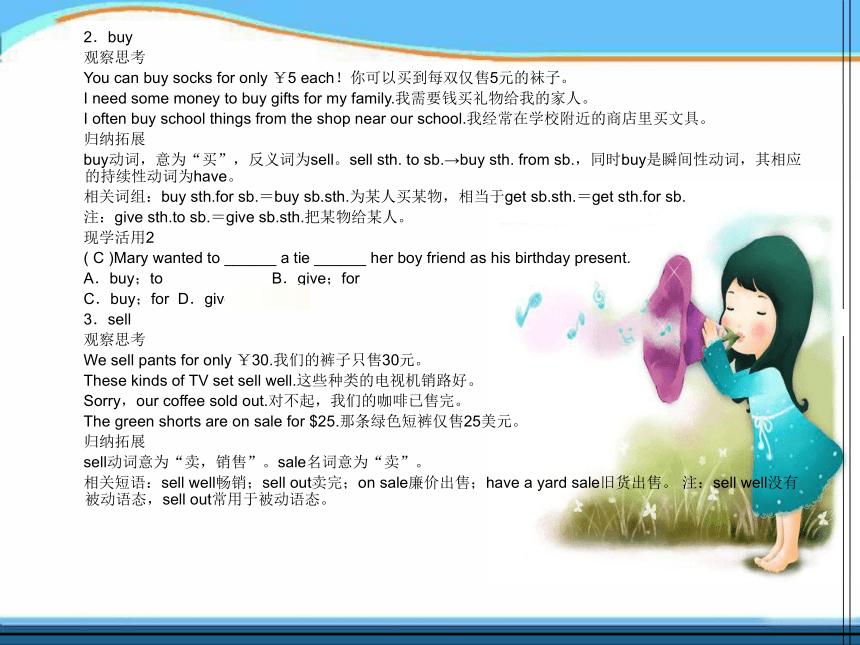
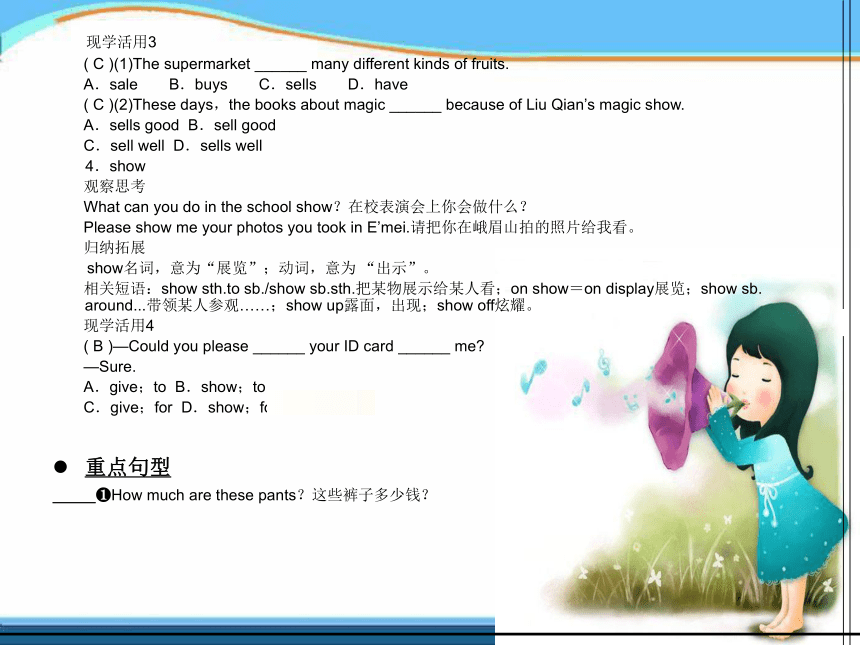
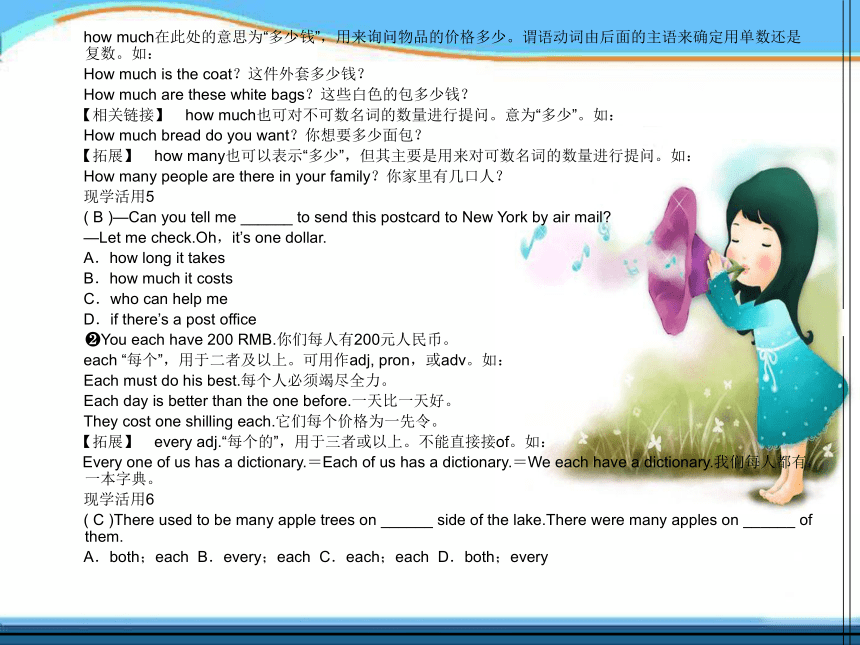
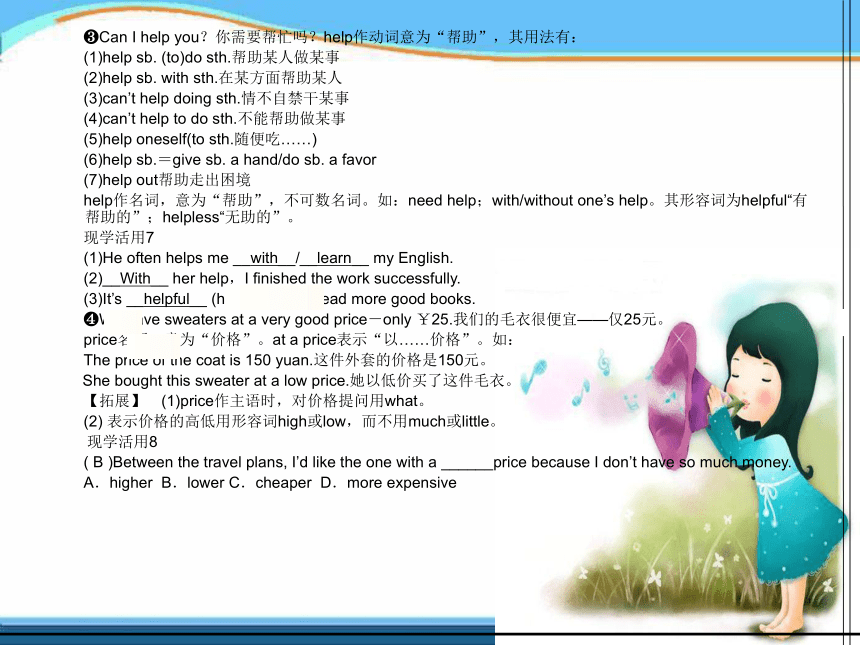
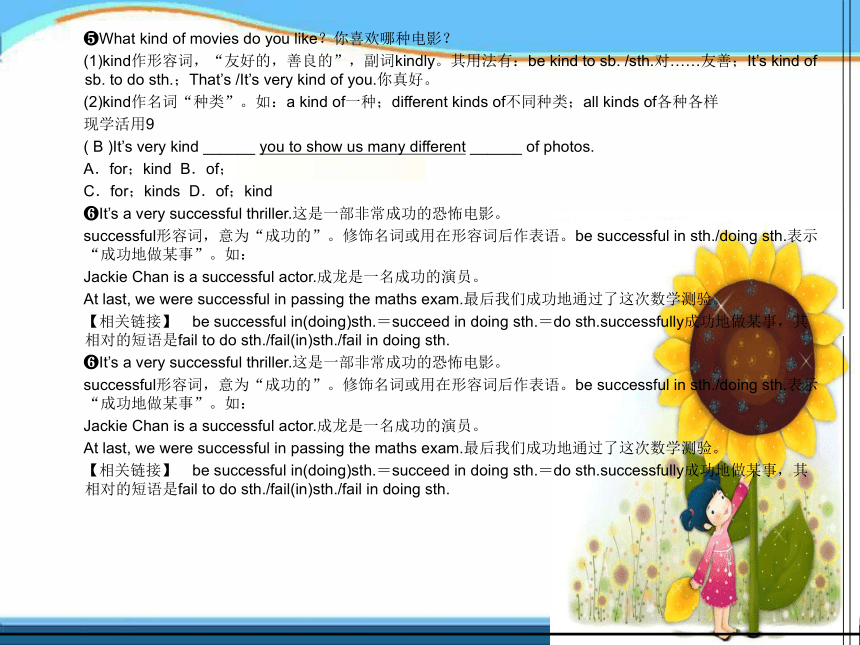
文档简介
课件22张PPT。 ? 词汇派生
1.help(v.)→__helpful__(adj.)有帮助的→__helpless__(adj.)没有帮助的
2.buy(v.)→__bought__(过去式)买
3.sell(v.)→__sale__(n.)出售→__buy__(反义词)购买
4.act(v.)→__action__(n.)动作→__actor__(n.)演员→__actress__(n.)女演员
5.fun(n.)→__funny__(adj.)有趣的
6.excite(v.)→__exciting__(adj.)令人激动的→__excited__(adj.)激动的;兴奋的
7.real(adj.)→__really__(adv.)无疑地;真正地
8.success(n.)→__successful__(adj.)成功的→__successfully__(adv.)成功地→__succeed__(v.)成功
9.music(n.)→__musician__(n.)音乐家→__musical__(adj.)音乐的
10.science(n.)→__scientist__(n.)科学家→__scientific__(adj.)科学的
11.teach(v.)→__teacher__(n.)教师
12.busy(adj.)→__business__(n.)生意;商业→__free__(反义词)空闲的
13.tire(v.)→__tiring__(adj.)令人疲倦的→__tired__(adj.)疲倦的;累的
14.description(n.)→__describe__(v.)描述
15.write(v.)→__writer__(n.)作者
16.speak(v.)→__speaker__(n.)演说家;扬声器→__speech__(n.)演讲 第2课 七年级(上) Units 7-12 ? 短语再现
1.how __much__(价钱)多少
2.__at__ a (very) good price以(非常)优惠的价格
3.have a __look__(at)看一看
4.__on__ sale(廉价)出售
5.how __old__多大年纪;几岁
6.school __trip__学校旅行
7.__on__ weekends在周末
8.a __little__少许;少量(后接不可数名词)9.get __up__起床
10.__take__ a shower洗澡
11.get __to__到达
12.go to __bed__上床睡觉
13.__do__ homework做作业
14.best __wishes__最衷心的祝愿
15.__after__ class/school下课/放学后
16.play __chess__下棋
17.__go__ to work去上班
18.go to a __movie__=__see__ a film去看电影
19.__Chinese__ history中国历史
20.__speech__ contest演讲比赛
21.go __home__回家
22.be strict __with__ sb. __in__ sth.在某事上对某人要求严格
? 句式回顾
根据句意或提示完成句子。(每空一词,含缩略词)
1.—__How_much_is__ the blue T-shirt?
—It’s ten dollars.
2.—When is Vera’s birthday?
—Vera’s birthday is __January_21st__(1月21日).
3.—How old is he?/__What’s__ his age?/What’s the age of him?他多大?
—He is eleven./He is a boy of eleven./He is an __eleven-year-old__ boy.他11岁。
4.—What kind of movies do you like?
—I __like__(喜欢)action movies and thrillers,__but__(但是)I __don’t__ __like__(不喜欢)documentaries.
5.—Can you dance?
—__Yes__,__I__ __can__.(肯定回答)
—__No__,__I__ __can’t__.(否定回答)
6.—__What__ __time__ do you usually get up?
—I get up at six o’clock.
7.—__What__ __time__ __is__ __it__?/__What’s____the__ __time__?(几点了?)
—It’s eleven o’clock.
8.—__What__ is your __favorite__ subject?(你最喜欢的科目是什么?) —My favorite subject is P.E.
—Why do you like P.E.?
—__Because__ it ’s fun.
9.__For__ boys,you can buy __socks__ for only ¥00000005 __each__ pair.对于男孩,你可以买袜子,每双只要5元。 —My favorite subject is P.E.
—Why do you like P.E.?
—__Because__ it ’s fun.
9.__For__ boys,you can buy __socks__ for only ¥00000005 __each__ pair.对于男孩,你可以买袜子,每双只要5元。
10.—__What__ __club__ do you want to __join__?你想加入哪个俱乐部?
—I want to join...club.我想加入……俱乐部。
11.Please __write__ and tell me __about__ your morning.请写信告诉我有关你早上的情况。
重点词汇
1.want
观察思考
I want a cup of coffee.我想要一杯咖啡。
I want to see an action movie.我想要去看动作片。
My teacher wants me to finish my homework on time.我的老师要我按时完成作业。
归纳拓展
want动词,意为“想要”,相当于would like。后接名词或动词不定式to do...或want sb.to do sth.(想要某人去做某事)。
现学活用1
(1)Alice,you __are_wanted__(want)on the phone.艾丽斯,有你的电话。
(2)Do you want __to__ __go__ with us?你想要跟我们一起去吗?
(3)My mother wants me __to__ __drink__ milk every day.妈妈想要我每天喝牛奶。 2.buy
观察思考
You can buy socks for only ¥5 each!你可以买到每双仅售5元的袜子。
I need some money to buy gifts for my family.我需要钱买礼物给我的家人。
I often buy school things from the shop near our school.我经常在学校附近的商店里买文具。
归纳拓展
buy动词,意为“买”,反义词为sell。sell sth. to sb.→buy sth. from sb.,同时buy是瞬间性动词,其相应的持续性动词为have。
相关词组:buy sth.for sb.=buy sb.sth.为某人买某物,相当于get sb.sth.=get sth.for sb.
注:give sth.to sb.=give sb.sth.把某物给某人。
现学活用2
( C )Mary wanted to ______ a tie ______ her boy friend as his birthday present.
A.buy;to B.give;for
C.buy;for D.give;/
3.sell
观察思考
We sell pants for only ¥30.我们的裤子只售30元。
These kinds of TV set sell well.这些种类的电视机销路好。
Sorry,our coffee sold out.对不起,我们的咖啡已售完。
The green shorts are on sale for $25.那条绿色短裤仅售25美元。
归纳拓展
sell动词意为“卖,销售”。sale名词意为“卖”。
相关短语:sell well畅销;sell out卖完;on sale廉价出售;have a yard sale旧货出售。 注:sell well没有被动语态,sell out常用于被动语态。 现学活用3
( C )(1)The supermarket ______ many different kinds of fruits.
A.sale B.buys C.sells D.have
( C )(2)These days,the books about magic ______ because of Liu Qian’s magic show.
A.sells good B.sell good
C.sell well D.sells well
4.show
观察思考
What can you do in the school show?在校表演会上你会做什么?
Please show me your photos you took in E’mei.请把你在峨眉山拍的照片给我看。
归纳拓展
show名词,意为“展览”;动词,意为 “出示”。
相关短语:show sth.to sb./show sb.sth.把某物展示给某人看;on show=on display展览;show sb. around...带领某人参观……;show up露面,出现;show off炫耀。
现学活用4
( B )—Could you please ______ your ID card ______ me?
—Sure.
A.give;to B.show;to
C.give;for D.show;for
重点句型
?How much are these pants?这些裤子多少钱? how much在此处的意思为“多少钱”,用来询问物品的价格多少。谓语动词由后面的主语来确定用单数还是复数。如:
How much is the coat?这件外套多少钱?
How much are these white bags?这些白色的包多少钱?
【相关链接】 how much也可对不可数名词的数量进行提问。意为“多少”。如:
How much bread do you want?你想要多少面包?
【拓展】 how many也可以表示“多少”,但其主要是用来对可数名词的数量进行提问。如:
How many people are there in your family?你家里有几口人?
现学活用5
( B )—Can you tell me ______ to send this postcard to New York by air mail?
—Let me check.Oh,it’s one dollar.
A.how long it takes
B.how much it costs
C.who can help me
D.if there’s a post office
?You each have 200 RMB.你们每人有200元人民币。
each “每个”,用于二者及以上。可用作adj, pron,或adv。如:
Each must do his best.每个人必须竭尽全力。
Each day is better than the one before.一天比一天好。
They cost one shilling each.它们每个价格为一先令。
【拓展】 every adj.“每个的”,用于三者或以上。不能直接接of。如:
Every one of us has a dictionary.=Each of us has a dictionary.=We each have a dictionary.我们每人都有一本字典。
现学活用6
( C )There used to be many apple trees on ______ side of the lake.There were many apples on ______ of them.
A.both;each B.every;each C.each;each D.both;every ?Can I help you?你需要帮忙吗?help作动词意为“帮助”,其用法有:
(1)help sb. (to)do sth.帮助某人做某事
(2)help sb. with sth.在某方面帮助某人
(3)can’t help doing sth.情不自禁干某事
(4)can’t help to do sth.不能帮助做某事
(5)help oneself(to sth.随便吃……)
(6)help sb.=give sb. a hand/do sb. a favor
(7)help out帮助走出困境
help作名词,意为“帮助”,不可数名词。如:need help;with/without one’s help。其形容词为helpful“有帮助的”;helpless“无助的”。
现学活用7
(1)He often helps me __with__/__learn__ my English.
(2)__With__ her help,I finished the work successfully.
(3)It’s __helpful__ (help) for us to read more good books.
?We have sweaters at a very good price-only ¥25.我们的毛衣很便宜——仅25元。
price名词,意为“价格”。at a price表示“以……价格”。如:
The price of the coat is 150 yuan.这件外套的价格是150元。
She bought this sweater at a low price.她以低价买了这件毛衣。
【拓展】 (1)price作主语时,对价格提问用what。
(2) 表示价格的高低用形容词high或low,而不用much或little。
现学活用8
( B )Between the travel plans, I’d like the one with a ______price because I don’t have so much money.
A.higher B.lower C.cheaper D.more expensive
?What kind of movies do you like?你喜欢哪种电影?
(1)kind作形容词,“友好的,善良的”,副词kindly。其用法有:be kind to sb. /sth.对……友善;It’s kind of sb. to do sth.;That’s /It’s very kind of you.你真好。
(2)kind作名词“种类”。如:a kind of一种;different kinds of不同种类;all kinds of各种各样
现学活用9
( B )It’s very kind ______ you to show us many different ______ of photos.
A.for;kind B.of;kinds
C.for;kinds D.of;kind
?It’s a very successful thriller.这是一部非常成功的恐怖电影。
successful形容词,意为“成功的”。修饰名词或用在形容词后作表语。be successful in sth./doing sth.表示“成功地做某事”。如:
Jackie Chan is a successful actor.成龙是一名成功的演员。
At last, we were successful in passing the maths exam.最后我们成功地通过了这次数学测验。
【相关链接】 be successful in(doing)sth.=succeed in doing sth.=do sth.successfully成功地做某事,其相对的短语是fail to do sth./fail(in)sth./fail in doing sth.
?It’s a very successful thriller.这是一部非常成功的恐怖电影。
successful形容词,意为“成功的”。修饰名词或用在形容词后作表语。be successful in sth./doing sth.表示“成功地做某事”。如:
Jackie Chan is a successful actor.成龙是一名成功的演员。
At last, we were successful in passing the maths exam.最后我们成功地通过了这次数学测验。
【相关链接】 be successful in(doing)sth.=succeed in doing sth.=do sth.successfully成功地做某事,其相对的短语是fail to do sth./fail(in)sth./fail in doing sth. 现学活用10
We held the 2008 Olympics __successfully__.(改为同义句)
=We __succeeded__ in holding the 2008 Olympics.
=We were __successful__ in holding the 2008 Olympics.
=The 2008 Olympics was a great __success__.
?I want to join the art club.我想参加美术俱乐部。
(1)join动词,意为“参加,加入”。指“参加某个组织、党派、团体等,并成为其中的一个成员”。其延续性表达为:be a member of...for...year或be in...for...year。如:
My brother joined the army last year.我哥哥去年参的军。=My brother has been a member of army for one year.
(2)join后面还可以接表示人的名词或代词,表示加入到某人或某些人的行列。如:
We are going for a swim.Will you come and join us?我们要去游泳。你和我们一起去好吗?
(3)join还可以用于结构join sb.in (doing)中,表示“加入、参与某人的某项活动”。如:
Will you join us in playing basketball?你跟我们一起打篮球好吗?
【拓展】 take part in也是“参加,加入”的意思,但其指“参加某种活动、会议”等。相当于join in。如:
I will take part in the school meet next week.下周我将参加学校的运动会。
现学活用11
(1)He joined the army five years ago.(改为同义句)
=He has been __in__ __the__ __army__ for five years.
(2)He joined the army for five years.(改错)
He has been __a__ __soldier__ for 5 years.
(3)Which sport do you take part in this year?(改为同义句)
=Which sport do you __join__ __in__ this year?
3.little,a little,few,a few 观察思考
There is little milk in the glass.杯子里几乎没牛奶了。
He can speak a little English.他会说一点儿英语。
She said that memorizing the words of
pop also helped a little.她说记流行歌词也有点帮助。
Few eggs are left,we have to buy some.没多少鸡蛋剩下了,我们不得不买一些。
There are a few apples on the table. Would you like one?桌上有一些苹果,你要一个吗?
归纳拓展
little作形容词时修饰不可数名词,意为“少量”(几乎没有),表否定意义。
a little意为“一点儿”,表肯定意义。
little,a little可修饰动词,放在动词之后。
few修饰可数名词,意为“少量”(几乎没有),表否定意义。
a few意为“一点儿”,表肯定意义。
注意:little作形容词时还可修饰可数名词,意为“小的,可爱的”。如: There are such little sheep on the hill.山上有些如此小的绵羊。
There is so little water in the bottle.瓶子里只有这么点水。
现学活用17
(1)There is __a_little__ time left,we don’t have to run to school.
(2)The math problem is so difficult.__Few__ students can work it out.
(3)There is __little__ water,is there?
4.and,but,or
观察思考
They like potatoes and fish.他们喜欢土豆和鱼。
He likes playing football,and he is good at it.他喜欢踢足球,并且很擅长。
He has a great sports collection,but he doesn’t play sports at all.他有很丰富的运动收藏,但他根本不运动。
He doesn’t like rice or noodles.他不喜欢米饭和面条。
Which do you like better,the blue one or the green one?你比较喜欢哪一个,蓝色的还是绿色的?
Put the food in the fridge,or it will go bad.把食物放在冰箱里,否则它会变质。 ?Can you speak English?你能说英语吗?
speak动词,意为“说,说话”。着重说的动作,不强调说的内容。作及物动词使用时,常以某种语言作宾语;作不及物动词时,常用于speak to跟某人说话结构中。如:
I don’t speak Russian.I speak Chinese.我不说俄语,我说汉语。
She is speaking to her teacher.她正在跟她的老师说话。
【拓展】 say, tell, talk
(1)say “说”,一般用作及物动词,强调说的内容。其宾语可以是名词、代词或直接引语、间接引语等。如:
Please say it in English.请用英语讲。
Let’s go and say hello to him.让我们去向他问个好吧。
(2) tell“讲述,告诉”。动词后常接双宾语。着重把一件事传达给别人。另外tell与can/或be able to搭配表“辨认”。如:
She is telling the children a story.她正在给孩子们讲故事。
The teacher often tells us not to talk in class.老师经常告诉我们不要在课堂上讲话。
I can’t tell dream from truth.我无法分辨梦境和现实。
(3) talk“交谈,谈话”,一般用作不及物动词,着重强调两人之间的相互说话。带宾语时加about/to/with。如:
She is talking with John in English.她正在和约翰用英语交谈。
现学活用12
( A )(1)“Don’t ______ to strangers on your way to and from school,” mother often ______ to me.
A.speak;says B.speak;tells
C.talk;speaks D.talk;tells
(2)Excuse me.I can’t __speak__ French.Can we __talk__ about it in English?
(3)__Tell__ me you email address so that I can send you the photos.
(4)He __said__ goodbye to his parents and left home.
(5)How do you __say__ it in English? 现学活用12
( A )(1)“Don’t ______ to strangers on your way to and from school,” mother often ______ to me.
A.speak;says B.speak;tells
C.talk;speaks D.talk;tells
(2)Excuse me.I can’t __speak__ French.Can we __talk__ about it in English?
(3)__Tell__ me you email address so that I can send you the photos.
(4)He __said__ goodbye to his parents and left home.
(5)How do you __say__ it in English?
现学活用12
( A )(1)“Don’t ______ to strangers on your way to and from school,” mother often ______ to me.
A.speak;says B.speak;tells
C.talk;speaks D.talk;tells
(2)Excuse me.I can’t __speak__ French.Can we __talk__ about it in English?
(3)__Tell__ me you email address so that I can send you the photos.
(4)He __said__ goodbye to his parents and left home.
(5)How do you __say__ it in English?
现学活用12
( A )(1)“Don’t ______ to strangers on your way to and from school,” mother often ______ to me.
A.speak;says B.speak;tells
C.talk;speaks D.talk;tells
(2)Excuse me.I can’t __speak__ French.Can we __talk__ about it in English?
(3)__Tell__ me you email address so that I can send you the photos.
(4)He __said__ goodbye to his parents and left home.
(5)How do you __say__ it in English? “What is your favorite subject?” Miss Wang asks me.“你最喜爱的科目是什么?”王老师问我。
ask动词,意为“问;询问”。用法有:
(1)ask sb.sth.询问某人某事。如:
May I ask you a question?我可以问你一个问题吗?
(2)ask to do sth.请求去做某事。如:
He asked to go with us.他请求和我们一块去。
(3)ask.sb.(not) to do sth.叫某人(不)去干某事。如:
The teacher asks us to do lots of homework.老师叫我们去做许多家庭作业。
(4)ask sb.for sth.向某人寻求某事。如:
He often asks his friends for help when he is in trouble.当他遇到困难时,他常向他的朋友请求帮助。
现学活用14
( D )Justin’s parents often ask him ______too many computer games.It’s bad for his eyes.
A.to play B.don’t play
C.not play D.not to play
易混辩异
1.with,in,by,on
观察思考
We see with our eyes.我们用眼睛看。
What’s this in Chinese?这用中文怎么说?
We often go to school by bus.我们经常乘公交车去上学。
I study English by listening to the tapes.我通过听磁带学英语。 ind out意为“查明(事实或事情的真相)”。
discover意为“发现”,强调第一次发现已存在的东西。
3.little,a little,few,a few
观察思考
There is little milk in the glass.杯子里几乎没牛奶了。
He can speak a little English.他会说一点儿英语。
She said that memorizing the words of pop also helped a little.她说记流行歌词也有点帮助。
Few eggs are left,we have to buy some.没多少鸡蛋剩下了,我们不得不买一些。
There are a few apples on the table. Would you like one?桌上有一些苹果,你要一个吗?
归纳拓展
little作形容词时修饰不可数名词,意为“少量”(几乎没有),表否定意义。
a little意为“一点儿”,表肯定意义。
little,a little可修饰动词,放在动词之后。
few修饰可数名词,意为“少量”(几乎没有),表否定意义。
a few意为“一点儿”,表肯定意义。
注意:little作形容词时还可修饰可数名词,意为“小的,可爱的”。如:
There are such little sheep on the hill.山上有些如此小的绵羊。
There is so little water in the bottle.瓶子里只有这么点水。
现学活用17
(1)There is __a_little__ time left,we don’t have to run to school.
(2)The math problem is so difficult.__Few__ students can work it out.
(3)There is __little__ water,is there? 4.and,but,or
观察思考
They like potatoes and fish.他们喜欢土豆和鱼。
He likes playing football,and he is good at it.他喜欢踢足球,并且很擅长。
He has a great sports collection,but he doesn’t play sports at all.他有很丰富的运动收藏,但他根本不运动。
He doesn’t like rice or noodles.他不喜欢米饭和面条。
Which do you like better,the blue one or the green one?你比较喜欢哪一个,蓝色的还是绿色的?
Put the food in the fridge,or it will go bad.把食物放在冰箱里,否则它会变质。
归纳拓展
and连词,意为“和,又,而”,连接意思相近的两部分。
but连词,意为“但是”,连接意思相反的两部分。
or连词,意为“和”用于否定句中;意为“或者”,连接表示“选择”的两部分;意为“否则”,表示“可能”。
现学活用18
(1)He was tired,__but__ he didn’t stop to have a rest.
(2)Do you like pop music __or__classical music?
(3)Hurry up,__or__ you’ll be late for school.
(4)Study harder,__and__ you will pass the test.
(5)He is quite active.He always plays soccer __or__ basketball with his friends after school.
5.after,later,in
观察思考
After breakfast he plays his guitar,then he goes to work.早饭后他弹吉他,然后去上班。 After ten years,he returned to his hometown.十年后,他回到了他的家乡。
Eight months later,he was not a student any more.八个月后,他不再是个学生。
I will go to Beijing on May Day,and will go there again two weeks later.五一我会去北京,两星期后我会再去。
You’ll get there in five minutes.你会在五分钟后到那儿。
归纳拓展
after介词、连词,意为“在……之后”。用来表示某一具体时间或事件之后,谓语动词可用过去时或将来时;表示从过去某时起一段时间之后,谓语动词用过去时。
later(late的比较级)副词,意为“在……之后”。要根据上下文意思来考虑动词时态的正确运用。用于过去时中,“一段时间+later”相当于“after+一段时间”。
in用于将来时态,可意为“在……之后”,回答how soon的问句。
现学活用19
(1)一个星期后,她回来了。
__After_a_week__,she came back.
She came back __a_week_later__.
(2)He has gone to Hong Kong,and he will come back __in__ a week.
写作指导
启事的写作
常见的启事有寻物启事(Lost)、招领启事(Found)、征文启事(Contributions)等。启事由标题、正文、签名等部分组成。
一、启事的写作格式
1.将启事的要点作为标题(Lost, Found),写在正文上方正中的位置; 2.发布启事的日期写在正文的右上方,也可以省略不写;
3.署名位于正文下方。如果正文已经出现,也可以省略不写。
二、写英文启事的注意事项
1.启事一般不用称呼和结束语,要求语言简明;
2.一般的启事正文都比较简短,通常包括what(物品及其2.发布启事的日期写在正文的右上方,也可以省略不写;
x.写招领启事,物品的具体特征不要写得过于详细,以防有人冒领。
三、常用句型
1.I found... on my way home yesterday.昨天在回家的路上,我碰巧捡到……
2.A red handbag with some cards in it was left on the playground on September 1st.9月1日那天,一个装有几张卡的红色手提包被落在了操场上。
3.There is/ are... in it.里面有……
4.Please sent it to...请把它送给……
5.Please call sb. at...请拨打电话……找某人。
四、写作模板
Lost
__________(日期)
I was so careless that I lost __________(遗失的物品)__________(遗失的地点) around __________(遗失的时间). __________(失物的特征). __________(失物的重要性). If you are the kind finder, could you do me a favour to send it to __________(送还的地点) or ring me up? I’ll be very grateful for your kindness.Loser, __________(署名)
Address:__________(失主的地址)
Tel:__________(失主的电话)
Loser, __________(署名)
Found __________(日期)
I happened to find __________(捡到的物品名称)on the __________(发现的地点). In the __________(捡到的物品),there are __________(大体描述物品的种类、特征). Please come to __________(认领地点)to take it back.
Finder, __________(署名)
__________(捡到者的单位或电话)
五、范文欣赏
假设你是七年(3)班的辛迪(Cindy),本月18日在本校图书馆遗失钱包一个,内有一些钱和一张照片,拾到者请交七年(3)班班长或本人。
时间:2013年9月18日
Lost
September 18th, 2013
I’m from Class 3 Grade 7. I lost a wallet in the school library on the afternoon of September 18th. There are some money and a photo in it. Please send it to my monitor or me. Many thanks to the finder.
Cindy
当堂演练
Ⅰ.单词拼写。
1.Why don’t you __buy__(买) a toy for him?
2.Many teachers believe that children __learn__(学习)from life,not just from their textbook.
3.Henry is __looking__(寻找)for his T-shirt,but he can’t find it.
4.There are many __kinds__(种类)of different books in our library.
5.Help __yourselves__(随便吃)to the fish,children.
6.Our English teacher is always __strict__(严格) with us.
Ⅱ.单项选择。
( B )1.—Do you think the ______ of this skirt suits me? —Of course!You always look beautiful in red.(2012·台州) A.size B.color
C.price D.design
( D )2.Mary called and asked her husband ______ home at once, because she locked their daughter in the home.(2013·陕西)
A.to leave B.leave
C.go D.to go
( A )3.I always tell my students ______ on the road because it’s really dangerous.(2013·广州)
A.not to play B.to play not
C.not playing D.not play
( C )4.—______ can you finish this English examination?
—In about one and a half hours.(2013·安徽)
A.to leave B.leave
C.go D.to go
( A )3.I always tell my students ______ on the road because it’s really dangerous.(2013·广州)
A.not to play B.to play not
C.not playing D.not play
( C )4.—______ can you finish this English examination?
—In about one and a half hours.(2013·安徽)
—German and English.(2013·天津)
A.are speaking B.are spoken
C.speak D.is spoken
( A )7.—Help yourself to some more meat,Linda.
—______.(2012·武汉)
A.I’m full,thanks B.It’s my pleasure
C.It doesn’t matter D.Very well,thank you ( A )7.—Help yourself to some more meat,Linda.
—______.(2012·武汉)
A.I’m full,thanks B.It’s my pleasure
C.It doesn’t matter D.Very well,thank you
( A )7.—Help yourself to some more meat,Linda.
—______.(2012·武汉)
A.I’m full,thanks B.It’s my pleasure
C.It doesn’t matter D.Very well,thank you
( A )7.—Help yourself to some more meat,Linda.
—______.(2012·武汉)
A.I’m full,thanks B.It’s my pleasure
C.It doesn’t matter D.Very well,thank you
information they need.(2012·上海)
A.When B.Where
C.Why D.What
( A )15.To live a green life,we should try to save ______ energy and produce ______ pollution.(2012·呼和浩特)
A.more;less B.less;more
C.more;fewer D.most;least
Ⅲ.口语应用。(2013·福州)
根据对话内容,选择恰当的句子补全下面对话。
A. We’ve known each other since we were kids. B. Where is she from?
C. You mean the girl reading a book?
D. What does she look like?
E. Could you introduce me to her?
F. She is always ready to help others.
G. Then let’s talk to her when she stops reading.
W: Do you know the girl in red under the tree?
M: 1.__C__
W: Right. Do you know her?
M: Of course. She’s Lily. 2.__A__
W: Is she easy to get along with?
M: Yes. She is kind. 3.__F__ So she is very popular with the people around her.
W: I want to make friends with her. 4.__E__
M: Certainly. But I don’t want to disturb her now. She seems to lose herself in the book.
W: OK. 5.__G__
M: All right.
课后测评 【见测试篇】
1.help(v.)→__helpful__(adj.)有帮助的→__helpless__(adj.)没有帮助的
2.buy(v.)→__bought__(过去式)买
3.sell(v.)→__sale__(n.)出售→__buy__(反义词)购买
4.act(v.)→__action__(n.)动作→__actor__(n.)演员→__actress__(n.)女演员
5.fun(n.)→__funny__(adj.)有趣的
6.excite(v.)→__exciting__(adj.)令人激动的→__excited__(adj.)激动的;兴奋的
7.real(adj.)→__really__(adv.)无疑地;真正地
8.success(n.)→__successful__(adj.)成功的→__successfully__(adv.)成功地→__succeed__(v.)成功
9.music(n.)→__musician__(n.)音乐家→__musical__(adj.)音乐的
10.science(n.)→__scientist__(n.)科学家→__scientific__(adj.)科学的
11.teach(v.)→__teacher__(n.)教师
12.busy(adj.)→__business__(n.)生意;商业→__free__(反义词)空闲的
13.tire(v.)→__tiring__(adj.)令人疲倦的→__tired__(adj.)疲倦的;累的
14.description(n.)→__describe__(v.)描述
15.write(v.)→__writer__(n.)作者
16.speak(v.)→__speaker__(n.)演说家;扬声器→__speech__(n.)演讲 第2课 七年级(上) Units 7-12 ? 短语再现
1.how __much__(价钱)多少
2.__at__ a (very) good price以(非常)优惠的价格
3.have a __look__(at)看一看
4.__on__ sale(廉价)出售
5.how __old__多大年纪;几岁
6.school __trip__学校旅行
7.__on__ weekends在周末
8.a __little__少许;少量(后接不可数名词)9.get __up__起床
10.__take__ a shower洗澡
11.get __to__到达
12.go to __bed__上床睡觉
13.__do__ homework做作业
14.best __wishes__最衷心的祝愿
15.__after__ class/school下课/放学后
16.play __chess__下棋
17.__go__ to work去上班
18.go to a __movie__=__see__ a film去看电影
19.__Chinese__ history中国历史
20.__speech__ contest演讲比赛
21.go __home__回家
22.be strict __with__ sb. __in__ sth.在某事上对某人要求严格
? 句式回顾
根据句意或提示完成句子。(每空一词,含缩略词)
1.—__How_much_is__ the blue T-shirt?
—It’s ten dollars.
2.—When is Vera’s birthday?
—Vera’s birthday is __January_21st__(1月21日).
3.—How old is he?/__What’s__ his age?/What’s the age of him?他多大?
—He is eleven./He is a boy of eleven./He is an __eleven-year-old__ boy.他11岁。
4.—What kind of movies do you like?
—I __like__(喜欢)action movies and thrillers,__but__(但是)I __don’t__ __like__(不喜欢)documentaries.
5.—Can you dance?
—__Yes__,__I__ __can__.(肯定回答)
—__No__,__I__ __can’t__.(否定回答)
6.—__What__ __time__ do you usually get up?
—I get up at six o’clock.
7.—__What__ __time__ __is__ __it__?/__What’s____the__ __time__?(几点了?)
—It’s eleven o’clock.
8.—__What__ is your __favorite__ subject?(你最喜欢的科目是什么?) —My favorite subject is P.E.
—Why do you like P.E.?
—__Because__ it ’s fun.
9.__For__ boys,you can buy __socks__ for only ¥00000005 __each__ pair.对于男孩,你可以买袜子,每双只要5元。 —My favorite subject is P.E.
—Why do you like P.E.?
—__Because__ it ’s fun.
9.__For__ boys,you can buy __socks__ for only ¥00000005 __each__ pair.对于男孩,你可以买袜子,每双只要5元。
10.—__What__ __club__ do you want to __join__?你想加入哪个俱乐部?
—I want to join...club.我想加入……俱乐部。
11.Please __write__ and tell me __about__ your morning.请写信告诉我有关你早上的情况。
重点词汇
1.want
观察思考
I want a cup of coffee.我想要一杯咖啡。
I want to see an action movie.我想要去看动作片。
My teacher wants me to finish my homework on time.我的老师要我按时完成作业。
归纳拓展
want动词,意为“想要”,相当于would like。后接名词或动词不定式to do...或want sb.to do sth.(想要某人去做某事)。
现学活用1
(1)Alice,you __are_wanted__(want)on the phone.艾丽斯,有你的电话。
(2)Do you want __to__ __go__ with us?你想要跟我们一起去吗?
(3)My mother wants me __to__ __drink__ milk every day.妈妈想要我每天喝牛奶。 2.buy
观察思考
You can buy socks for only ¥5 each!你可以买到每双仅售5元的袜子。
I need some money to buy gifts for my family.我需要钱买礼物给我的家人。
I often buy school things from the shop near our school.我经常在学校附近的商店里买文具。
归纳拓展
buy动词,意为“买”,反义词为sell。sell sth. to sb.→buy sth. from sb.,同时buy是瞬间性动词,其相应的持续性动词为have。
相关词组:buy sth.for sb.=buy sb.sth.为某人买某物,相当于get sb.sth.=get sth.for sb.
注:give sth.to sb.=give sb.sth.把某物给某人。
现学活用2
( C )Mary wanted to ______ a tie ______ her boy friend as his birthday present.
A.buy;to B.give;for
C.buy;for D.give;/
3.sell
观察思考
We sell pants for only ¥30.我们的裤子只售30元。
These kinds of TV set sell well.这些种类的电视机销路好。
Sorry,our coffee sold out.对不起,我们的咖啡已售完。
The green shorts are on sale for $25.那条绿色短裤仅售25美元。
归纳拓展
sell动词意为“卖,销售”。sale名词意为“卖”。
相关短语:sell well畅销;sell out卖完;on sale廉价出售;have a yard sale旧货出售。 注:sell well没有被动语态,sell out常用于被动语态。 现学活用3
( C )(1)The supermarket ______ many different kinds of fruits.
A.sale B.buys C.sells D.have
( C )(2)These days,the books about magic ______ because of Liu Qian’s magic show.
A.sells good B.sell good
C.sell well D.sells well
4.show
观察思考
What can you do in the school show?在校表演会上你会做什么?
Please show me your photos you took in E’mei.请把你在峨眉山拍的照片给我看。
归纳拓展
show名词,意为“展览”;动词,意为 “出示”。
相关短语:show sth.to sb./show sb.sth.把某物展示给某人看;on show=on display展览;show sb. around...带领某人参观……;show up露面,出现;show off炫耀。
现学活用4
( B )—Could you please ______ your ID card ______ me?
—Sure.
A.give;to B.show;to
C.give;for D.show;for
重点句型
?How much are these pants?这些裤子多少钱? how much在此处的意思为“多少钱”,用来询问物品的价格多少。谓语动词由后面的主语来确定用单数还是复数。如:
How much is the coat?这件外套多少钱?
How much are these white bags?这些白色的包多少钱?
【相关链接】 how much也可对不可数名词的数量进行提问。意为“多少”。如:
How much bread do you want?你想要多少面包?
【拓展】 how many也可以表示“多少”,但其主要是用来对可数名词的数量进行提问。如:
How many people are there in your family?你家里有几口人?
现学活用5
( B )—Can you tell me ______ to send this postcard to New York by air mail?
—Let me check.Oh,it’s one dollar.
A.how long it takes
B.how much it costs
C.who can help me
D.if there’s a post office
?You each have 200 RMB.你们每人有200元人民币。
each “每个”,用于二者及以上。可用作adj, pron,或adv。如:
Each must do his best.每个人必须竭尽全力。
Each day is better than the one before.一天比一天好。
They cost one shilling each.它们每个价格为一先令。
【拓展】 every adj.“每个的”,用于三者或以上。不能直接接of。如:
Every one of us has a dictionary.=Each of us has a dictionary.=We each have a dictionary.我们每人都有一本字典。
现学活用6
( C )There used to be many apple trees on ______ side of the lake.There were many apples on ______ of them.
A.both;each B.every;each C.each;each D.both;every ?Can I help you?你需要帮忙吗?help作动词意为“帮助”,其用法有:
(1)help sb. (to)do sth.帮助某人做某事
(2)help sb. with sth.在某方面帮助某人
(3)can’t help doing sth.情不自禁干某事
(4)can’t help to do sth.不能帮助做某事
(5)help oneself(to sth.随便吃……)
(6)help sb.=give sb. a hand/do sb. a favor
(7)help out帮助走出困境
help作名词,意为“帮助”,不可数名词。如:need help;with/without one’s help。其形容词为helpful“有帮助的”;helpless“无助的”。
现学活用7
(1)He often helps me __with__/__learn__ my English.
(2)__With__ her help,I finished the work successfully.
(3)It’s __helpful__ (help) for us to read more good books.
?We have sweaters at a very good price-only ¥25.我们的毛衣很便宜——仅25元。
price名词,意为“价格”。at a price表示“以……价格”。如:
The price of the coat is 150 yuan.这件外套的价格是150元。
She bought this sweater at a low price.她以低价买了这件毛衣。
【拓展】 (1)price作主语时,对价格提问用what。
(2) 表示价格的高低用形容词high或low,而不用much或little。
现学活用8
( B )Between the travel plans, I’d like the one with a ______price because I don’t have so much money.
A.higher B.lower C.cheaper D.more expensive
?What kind of movies do you like?你喜欢哪种电影?
(1)kind作形容词,“友好的,善良的”,副词kindly。其用法有:be kind to sb. /sth.对……友善;It’s kind of sb. to do sth.;That’s /It’s very kind of you.你真好。
(2)kind作名词“种类”。如:a kind of一种;different kinds of不同种类;all kinds of各种各样
现学活用9
( B )It’s very kind ______ you to show us many different ______ of photos.
A.for;kind B.of;kinds
C.for;kinds D.of;kind
?It’s a very successful thriller.这是一部非常成功的恐怖电影。
successful形容词,意为“成功的”。修饰名词或用在形容词后作表语。be successful in sth./doing sth.表示“成功地做某事”。如:
Jackie Chan is a successful actor.成龙是一名成功的演员。
At last, we were successful in passing the maths exam.最后我们成功地通过了这次数学测验。
【相关链接】 be successful in(doing)sth.=succeed in doing sth.=do sth.successfully成功地做某事,其相对的短语是fail to do sth./fail(in)sth./fail in doing sth.
?It’s a very successful thriller.这是一部非常成功的恐怖电影。
successful形容词,意为“成功的”。修饰名词或用在形容词后作表语。be successful in sth./doing sth.表示“成功地做某事”。如:
Jackie Chan is a successful actor.成龙是一名成功的演员。
At last, we were successful in passing the maths exam.最后我们成功地通过了这次数学测验。
【相关链接】 be successful in(doing)sth.=succeed in doing sth.=do sth.successfully成功地做某事,其相对的短语是fail to do sth./fail(in)sth./fail in doing sth. 现学活用10
We held the 2008 Olympics __successfully__.(改为同义句)
=We __succeeded__ in holding the 2008 Olympics.
=We were __successful__ in holding the 2008 Olympics.
=The 2008 Olympics was a great __success__.
?I want to join the art club.我想参加美术俱乐部。
(1)join动词,意为“参加,加入”。指“参加某个组织、党派、团体等,并成为其中的一个成员”。其延续性表达为:be a member of...for...year或be in...for...year。如:
My brother joined the army last year.我哥哥去年参的军。=My brother has been a member of army for one year.
(2)join后面还可以接表示人的名词或代词,表示加入到某人或某些人的行列。如:
We are going for a swim.Will you come and join us?我们要去游泳。你和我们一起去好吗?
(3)join还可以用于结构join sb.in (doing)中,表示“加入、参与某人的某项活动”。如:
Will you join us in playing basketball?你跟我们一起打篮球好吗?
【拓展】 take part in也是“参加,加入”的意思,但其指“参加某种活动、会议”等。相当于join in。如:
I will take part in the school meet next week.下周我将参加学校的运动会。
现学活用11
(1)He joined the army five years ago.(改为同义句)
=He has been __in__ __the__ __army__ for five years.
(2)He joined the army for five years.(改错)
He has been __a__ __soldier__ for 5 years.
(3)Which sport do you take part in this year?(改为同义句)
=Which sport do you __join__ __in__ this year?
3.little,a little,few,a few 观察思考
There is little milk in the glass.杯子里几乎没牛奶了。
He can speak a little English.他会说一点儿英语。
She said that memorizing the words of
pop also helped a little.她说记流行歌词也有点帮助。
Few eggs are left,we have to buy some.没多少鸡蛋剩下了,我们不得不买一些。
There are a few apples on the table. Would you like one?桌上有一些苹果,你要一个吗?
归纳拓展
little作形容词时修饰不可数名词,意为“少量”(几乎没有),表否定意义。
a little意为“一点儿”,表肯定意义。
little,a little可修饰动词,放在动词之后。
few修饰可数名词,意为“少量”(几乎没有),表否定意义。
a few意为“一点儿”,表肯定意义。
注意:little作形容词时还可修饰可数名词,意为“小的,可爱的”。如: There are such little sheep on the hill.山上有些如此小的绵羊。
There is so little water in the bottle.瓶子里只有这么点水。
现学活用17
(1)There is __a_little__ time left,we don’t have to run to school.
(2)The math problem is so difficult.__Few__ students can work it out.
(3)There is __little__ water,is there?
4.and,but,or
观察思考
They like potatoes and fish.他们喜欢土豆和鱼。
He likes playing football,and he is good at it.他喜欢踢足球,并且很擅长。
He has a great sports collection,but he doesn’t play sports at all.他有很丰富的运动收藏,但他根本不运动。
He doesn’t like rice or noodles.他不喜欢米饭和面条。
Which do you like better,the blue one or the green one?你比较喜欢哪一个,蓝色的还是绿色的?
Put the food in the fridge,or it will go bad.把食物放在冰箱里,否则它会变质。 ?Can you speak English?你能说英语吗?
speak动词,意为“说,说话”。着重说的动作,不强调说的内容。作及物动词使用时,常以某种语言作宾语;作不及物动词时,常用于speak to跟某人说话结构中。如:
I don’t speak Russian.I speak Chinese.我不说俄语,我说汉语。
She is speaking to her teacher.她正在跟她的老师说话。
【拓展】 say, tell, talk
(1)say “说”,一般用作及物动词,强调说的内容。其宾语可以是名词、代词或直接引语、间接引语等。如:
Please say it in English.请用英语讲。
Let’s go and say hello to him.让我们去向他问个好吧。
(2) tell“讲述,告诉”。动词后常接双宾语。着重把一件事传达给别人。另外tell与can/或be able to搭配表“辨认”。如:
She is telling the children a story.她正在给孩子们讲故事。
The teacher often tells us not to talk in class.老师经常告诉我们不要在课堂上讲话。
I can’t tell dream from truth.我无法分辨梦境和现实。
(3) talk“交谈,谈话”,一般用作不及物动词,着重强调两人之间的相互说话。带宾语时加about/to/with。如:
She is talking with John in English.她正在和约翰用英语交谈。
现学活用12
( A )(1)“Don’t ______ to strangers on your way to and from school,” mother often ______ to me.
A.speak;says B.speak;tells
C.talk;speaks D.talk;tells
(2)Excuse me.I can’t __speak__ French.Can we __talk__ about it in English?
(3)__Tell__ me you email address so that I can send you the photos.
(4)He __said__ goodbye to his parents and left home.
(5)How do you __say__ it in English? 现学活用12
( A )(1)“Don’t ______ to strangers on your way to and from school,” mother often ______ to me.
A.speak;says B.speak;tells
C.talk;speaks D.talk;tells
(2)Excuse me.I can’t __speak__ French.Can we __talk__ about it in English?
(3)__Tell__ me you email address so that I can send you the photos.
(4)He __said__ goodbye to his parents and left home.
(5)How do you __say__ it in English?
现学活用12
( A )(1)“Don’t ______ to strangers on your way to and from school,” mother often ______ to me.
A.speak;says B.speak;tells
C.talk;speaks D.talk;tells
(2)Excuse me.I can’t __speak__ French.Can we __talk__ about it in English?
(3)__Tell__ me you email address so that I can send you the photos.
(4)He __said__ goodbye to his parents and left home.
(5)How do you __say__ it in English?
现学活用12
( A )(1)“Don’t ______ to strangers on your way to and from school,” mother often ______ to me.
A.speak;says B.speak;tells
C.talk;speaks D.talk;tells
(2)Excuse me.I can’t __speak__ French.Can we __talk__ about it in English?
(3)__Tell__ me you email address so that I can send you the photos.
(4)He __said__ goodbye to his parents and left home.
(5)How do you __say__ it in English? “What is your favorite subject?” Miss Wang asks me.“你最喜爱的科目是什么?”王老师问我。
ask动词,意为“问;询问”。用法有:
(1)ask sb.sth.询问某人某事。如:
May I ask you a question?我可以问你一个问题吗?
(2)ask to do sth.请求去做某事。如:
He asked to go with us.他请求和我们一块去。
(3)ask.sb.(not) to do sth.叫某人(不)去干某事。如:
The teacher asks us to do lots of homework.老师叫我们去做许多家庭作业。
(4)ask sb.for sth.向某人寻求某事。如:
He often asks his friends for help when he is in trouble.当他遇到困难时,他常向他的朋友请求帮助。
现学活用14
( D )Justin’s parents often ask him ______too many computer games.It’s bad for his eyes.
A.to play B.don’t play
C.not play D.not to play
易混辩异
1.with,in,by,on
观察思考
We see with our eyes.我们用眼睛看。
What’s this in Chinese?这用中文怎么说?
We often go to school by bus.我们经常乘公交车去上学。
I study English by listening to the tapes.我通过听磁带学英语。 ind out意为“查明(事实或事情的真相)”。
discover意为“发现”,强调第一次发现已存在的东西。
3.little,a little,few,a few
观察思考
There is little milk in the glass.杯子里几乎没牛奶了。
He can speak a little English.他会说一点儿英语。
She said that memorizing the words of pop also helped a little.她说记流行歌词也有点帮助。
Few eggs are left,we have to buy some.没多少鸡蛋剩下了,我们不得不买一些。
There are a few apples on the table. Would you like one?桌上有一些苹果,你要一个吗?
归纳拓展
little作形容词时修饰不可数名词,意为“少量”(几乎没有),表否定意义。
a little意为“一点儿”,表肯定意义。
little,a little可修饰动词,放在动词之后。
few修饰可数名词,意为“少量”(几乎没有),表否定意义。
a few意为“一点儿”,表肯定意义。
注意:little作形容词时还可修饰可数名词,意为“小的,可爱的”。如:
There are such little sheep on the hill.山上有些如此小的绵羊。
There is so little water in the bottle.瓶子里只有这么点水。
现学活用17
(1)There is __a_little__ time left,we don’t have to run to school.
(2)The math problem is so difficult.__Few__ students can work it out.
(3)There is __little__ water,is there? 4.and,but,or
观察思考
They like potatoes and fish.他们喜欢土豆和鱼。
He likes playing football,and he is good at it.他喜欢踢足球,并且很擅长。
He has a great sports collection,but he doesn’t play sports at all.他有很丰富的运动收藏,但他根本不运动。
He doesn’t like rice or noodles.他不喜欢米饭和面条。
Which do you like better,the blue one or the green one?你比较喜欢哪一个,蓝色的还是绿色的?
Put the food in the fridge,or it will go bad.把食物放在冰箱里,否则它会变质。
归纳拓展
and连词,意为“和,又,而”,连接意思相近的两部分。
but连词,意为“但是”,连接意思相反的两部分。
or连词,意为“和”用于否定句中;意为“或者”,连接表示“选择”的两部分;意为“否则”,表示“可能”。
现学活用18
(1)He was tired,__but__ he didn’t stop to have a rest.
(2)Do you like pop music __or__classical music?
(3)Hurry up,__or__ you’ll be late for school.
(4)Study harder,__and__ you will pass the test.
(5)He is quite active.He always plays soccer __or__ basketball with his friends after school.
5.after,later,in
观察思考
After breakfast he plays his guitar,then he goes to work.早饭后他弹吉他,然后去上班。 After ten years,he returned to his hometown.十年后,他回到了他的家乡。
Eight months later,he was not a student any more.八个月后,他不再是个学生。
I will go to Beijing on May Day,and will go there again two weeks later.五一我会去北京,两星期后我会再去。
You’ll get there in five minutes.你会在五分钟后到那儿。
归纳拓展
after介词、连词,意为“在……之后”。用来表示某一具体时间或事件之后,谓语动词可用过去时或将来时;表示从过去某时起一段时间之后,谓语动词用过去时。
later(late的比较级)副词,意为“在……之后”。要根据上下文意思来考虑动词时态的正确运用。用于过去时中,“一段时间+later”相当于“after+一段时间”。
in用于将来时态,可意为“在……之后”,回答how soon的问句。
现学活用19
(1)一个星期后,她回来了。
__After_a_week__,she came back.
She came back __a_week_later__.
(2)He has gone to Hong Kong,and he will come back __in__ a week.
写作指导
启事的写作
常见的启事有寻物启事(Lost)、招领启事(Found)、征文启事(Contributions)等。启事由标题、正文、签名等部分组成。
一、启事的写作格式
1.将启事的要点作为标题(Lost, Found),写在正文上方正中的位置; 2.发布启事的日期写在正文的右上方,也可以省略不写;
3.署名位于正文下方。如果正文已经出现,也可以省略不写。
二、写英文启事的注意事项
1.启事一般不用称呼和结束语,要求语言简明;
2.一般的启事正文都比较简短,通常包括what(物品及其2.发布启事的日期写在正文的右上方,也可以省略不写;
x.写招领启事,物品的具体特征不要写得过于详细,以防有人冒领。
三、常用句型
1.I found... on my way home yesterday.昨天在回家的路上,我碰巧捡到……
2.A red handbag with some cards in it was left on the playground on September 1st.9月1日那天,一个装有几张卡的红色手提包被落在了操场上。
3.There is/ are... in it.里面有……
4.Please sent it to...请把它送给……
5.Please call sb. at...请拨打电话……找某人。
四、写作模板
Lost
__________(日期)
I was so careless that I lost __________(遗失的物品)__________(遗失的地点) around __________(遗失的时间). __________(失物的特征). __________(失物的重要性). If you are the kind finder, could you do me a favour to send it to __________(送还的地点) or ring me up? I’ll be very grateful for your kindness.Loser, __________(署名)
Address:__________(失主的地址)
Tel:__________(失主的电话)
Loser, __________(署名)
Found __________(日期)
I happened to find __________(捡到的物品名称)on the __________(发现的地点). In the __________(捡到的物品),there are __________(大体描述物品的种类、特征). Please come to __________(认领地点)to take it back.
Finder, __________(署名)
__________(捡到者的单位或电话)
五、范文欣赏
假设你是七年(3)班的辛迪(Cindy),本月18日在本校图书馆遗失钱包一个,内有一些钱和一张照片,拾到者请交七年(3)班班长或本人。
时间:2013年9月18日
Lost
September 18th, 2013
I’m from Class 3 Grade 7. I lost a wallet in the school library on the afternoon of September 18th. There are some money and a photo in it. Please send it to my monitor or me. Many thanks to the finder.
Cindy
当堂演练
Ⅰ.单词拼写。
1.Why don’t you __buy__(买) a toy for him?
2.Many teachers believe that children __learn__(学习)from life,not just from their textbook.
3.Henry is __looking__(寻找)for his T-shirt,but he can’t find it.
4.There are many __kinds__(种类)of different books in our library.
5.Help __yourselves__(随便吃)to the fish,children.
6.Our English teacher is always __strict__(严格) with us.
Ⅱ.单项选择。
( B )1.—Do you think the ______ of this skirt suits me? —Of course!You always look beautiful in red.(2012·台州) A.size B.color
C.price D.design
( D )2.Mary called and asked her husband ______ home at once, because she locked their daughter in the home.(2013·陕西)
A.to leave B.leave
C.go D.to go
( A )3.I always tell my students ______ on the road because it’s really dangerous.(2013·广州)
A.not to play B.to play not
C.not playing D.not play
( C )4.—______ can you finish this English examination?
—In about one and a half hours.(2013·安徽)
A.to leave B.leave
C.go D.to go
( A )3.I always tell my students ______ on the road because it’s really dangerous.(2013·广州)
A.not to play B.to play not
C.not playing D.not play
( C )4.—______ can you finish this English examination?
—In about one and a half hours.(2013·安徽)
—German and English.(2013·天津)
A.are speaking B.are spoken
C.speak D.is spoken
( A )7.—Help yourself to some more meat,Linda.
—______.(2012·武汉)
A.I’m full,thanks B.It’s my pleasure
C.It doesn’t matter D.Very well,thank you ( A )7.—Help yourself to some more meat,Linda.
—______.(2012·武汉)
A.I’m full,thanks B.It’s my pleasure
C.It doesn’t matter D.Very well,thank you
( A )7.—Help yourself to some more meat,Linda.
—______.(2012·武汉)
A.I’m full,thanks B.It’s my pleasure
C.It doesn’t matter D.Very well,thank you
( A )7.—Help yourself to some more meat,Linda.
—______.(2012·武汉)
A.I’m full,thanks B.It’s my pleasure
C.It doesn’t matter D.Very well,thank you
information they need.(2012·上海)
A.When B.Where
C.Why D.What
( A )15.To live a green life,we should try to save ______ energy and produce ______ pollution.(2012·呼和浩特)
A.more;less B.less;more
C.more;fewer D.most;least
Ⅲ.口语应用。(2013·福州)
根据对话内容,选择恰当的句子补全下面对话。
A. We’ve known each other since we were kids. B. Where is she from?
C. You mean the girl reading a book?
D. What does she look like?
E. Could you introduce me to her?
F. She is always ready to help others.
G. Then let’s talk to her when she stops reading.
W: Do you know the girl in red under the tree?
M: 1.__C__
W: Right. Do you know her?
M: Of course. She’s Lily. 2.__A__
W: Is she easy to get along with?
M: Yes. She is kind. 3.__F__ So she is very popular with the people around her.
W: I want to make friends with her. 4.__E__
M: Certainly. But I don’t want to disturb her now. She seems to lose herself in the book.
W: OK. 5.__G__
M: All right.
课后测评 【见测试篇】
